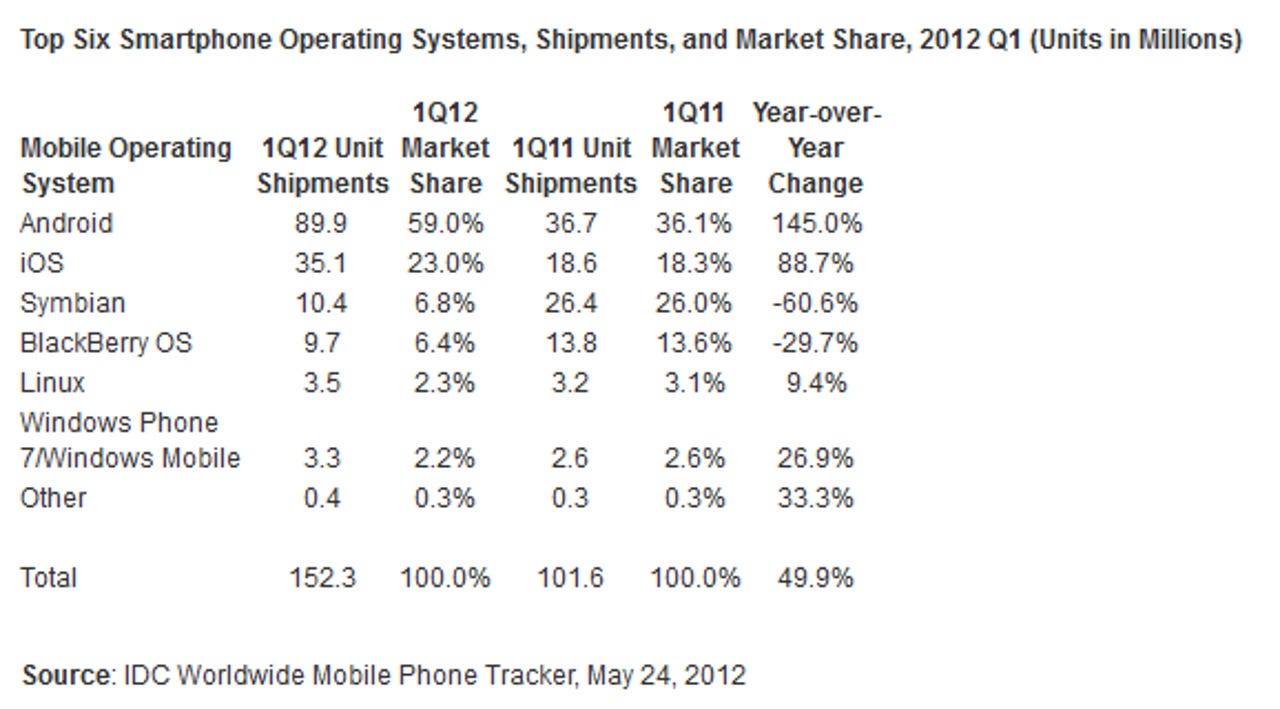Android, Apple iOS run away from pack: Can Windows Phone challenge at all?

IDC's latest stats on smartphone market share paint a rosy picture for the Android-Apple iOS duopoly while also sounding alarm bells for any challenger, notably Microsoft's Windows Phone platform.
Simply put, Android and iOS control a whopping 82 percent of the smartphone market. Android and Apple devices simply dominate with a combined market share of 82 percent. Android's first quarter market share was 59 percent and iOS had 23 percent.
In other words, Android has the army and Apple has the popularity and integrated phones.
See also: Will Windows Phone's bumpy start eventually lead to success? | Windows Phone: Photography the key to its success? |I'm still not giving up on Windows Phone | Microsoft's shifting priorities: It's about time | AT&T mobile chief: Windows 8 can boost Windows Phone
If you're a challenger to the Android-Apple tag team these standings are simply depressing. RIM's market share has tanked 30 percent from a year ago. Windows Phone hasn't really gotten any traction. Even Linux---fueled by Samsung's bada---is ahead of Windows Phone. And there's little marketing behind bada. To wit: Samsung accounted for 81.6 percent of all Linux smartphones.
As for Windows Phone, IDC said:
Windows Mobile/Windows Phone has yet to make significant inroads in the worldwide smartphone market, but 2012 should be considered a ramp-up year for Nokia and Microsoft to boost volumes. Until Nokia speeds the cadence of its smartphone releases or more vendors launch their own Windows Phone-powered smartphones, IDC anticipates slow growth for the operating system.
Simply put, Windows Phone is going to need more than Nokia at this rate. Samsung already has Android and Windows Phone in the fold. Going forward, Microsoft may need Samsung, HTC and others to carry the Windows Phone torch.
The problem here is obvious: Windows Phone is a lovely mobile operating system, but isn't materially better to entice consumers and businesses to sign up. Windows 8 may change that equation, but frankly we're running out of excuses for Windows Phone as a competitor.
RIM and its BlackBerry 10 platform could challenge, but we've heard about comebacks before.
Add it up and it may be time for a new challenger completely. Amazon? Facebook? Anybody. After all, every smartphone buyer wants more competition and a No. 3. Right now it's two powerhouses and a bunch of weaklings.
